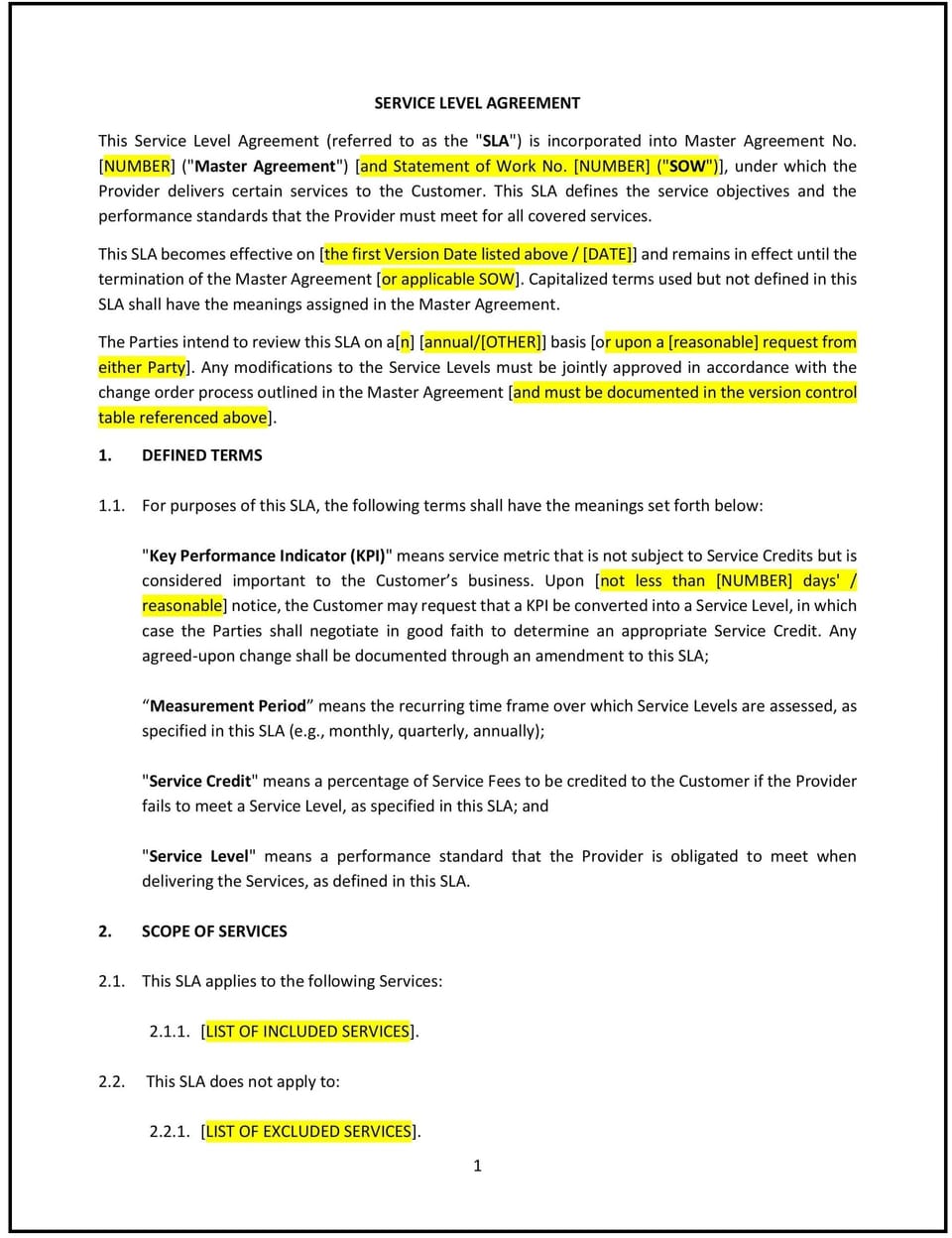Service Level Agreement (SLA) (Pennsylvania): Free template

Service Level Agreement (SLA) (Pennsylvania)
A Service Level Agreement (SLA) in Pennsylvania is a legally binding contract that establishes the expectations, performance standards, and responsibilities between a service provider and a client. This agreement helps ensure service reliability, outlines accountability, and provides remedies for service failures. SLAs are commonly used in industries such as IT services, cloud computing, managed services, consulting, and maintenance contracts.
Pennsylvania follows general contract law principles when enforcing SLAs. While no state-specific SLA regulations exist, businesses operating in industries such as healthcare, financial services, and telecommunications must comply with applicable federal and industry-specific regulations. A properly drafted SLA helps businesses mitigate risks, maintain service quality, and prevent disputes by setting clear service benchmarks.
Tips for drafting and maintaining a Service Level Agreement in Pennsylvania
- Clearly define the scope of services, outlining what is included and excluded, to prevent misunderstandings and disputes.
- Set measurable performance metrics, such as system uptime percentages, response times, and issue resolution deadlines, to ensure accountability.
- Specify client responsibilities, including any access to systems, necessary resources, or cooperation required to help the provider meet performance obligations.
- Establish remedies for service failures, such as service credits, refunds, or contract termination rights. Pennsylvania contract law allows businesses to negotiate these terms freely.
- Include a dispute resolution clause specifying whether conflicts will be resolved through Pennsylvania courts, arbitration, or mediation. Arbitration is often preferred for efficiency.
- Address data security and confidentiality requirements, particularly if the service provider handles sensitive customer or business information. Some industries may also be subject to federal data protection laws.
- Regularly review and update the SLA to reflect business changes, evolving industry standards, or legal updates to keep it relevant and enforceable.
Frequently asked questions (FAQs)
Q: What should Pennsylvania businesses include in a Service Level Agreement?
A: The agreement should outline service scope, performance standards, remedies for service failures, client responsibilities, dispute resolution procedures, and termination rights.
Q: How does an SLA benefit businesses in Pennsylvania?
A: It ensures service providers meet obligations, reduces misunderstandings, improves accountability, and offers structured solutions for addressing service failures.
Q: Are service credits enforceable in Pennsylvania SLAs?
A: Yes, service credits (such as financial compensation for unmet service levels) are enforceable if explicitly stated in the contract.
Q: What happens if a service provider does not meet SLA requirements in Pennsylvania?
A: Depending on the SLA terms, the client may be entitled to service credits, refunds, or contract termination. If a breach is serious, legal action may be necessary.
Q: How should Pennsylvania businesses handle SLA disputes?
A: The SLA should specify a dispute resolution method, such as negotiation, mediation, arbitration, or litigation in Pennsylvania courts.
Q: Are verbal SLAs enforceable in Pennsylvania?
A: While verbal contracts may sometimes be legally binding, a written SLA provides stronger legal protection and ensures clarity of expectations for both parties.
Q: Can an SLA be revised after signing in Pennsylvania?
A: Yes, but modifications require mutual agreement, and all changes should be documented in writing to prevent future misunderstandings.
This article contains general legal information and does not contain legal advice. Cobrief is not a law firm or a substitute for an attorney or law firm. The law is complex and changes often. For legal advice, please ask a lawyer.


